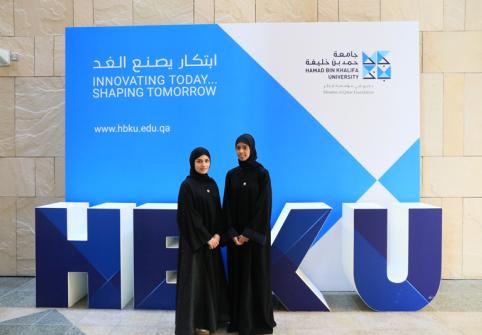News
The Building Blocks of Life: How Genomics Drive Healthcare
13 Feb 2019Less than a decade since its founding, the University’s young innovators are making strides in biomedicine.

If you were to ever search for Dalal or Munira, you are likely to find them tinkering with bedside equipment, counseling a hospital patient, or seamlessly operating devices nearly twice their weight and size.
This is a day in the life of both students, who are currently enrolled in the College of Health and Life Sciences’ (CHLS) newest academic program in genomics and precision medicine. Dalal and Munira’s time is evenly split between the classroom and state-of-the-art facilities that are housed by their employers.
The students’ efforts have been more recently recognized when they were chosen to WISH’s Young Innovators Program – a highly selective initiative that proactively seeks out Qatar’s rising stars in the field of biomedicine and beyond.
Biomedicine Boost: The Future is Personalized
Realizing Qatar’s ambitions to be a leading deliverer of healthcare excellence, HBKU’s CHLS launched its recent genomics program to cater to a long-serving vision of achieving only the best in the field of personalized and precision medicine.
The students receive unconditional support through HBKU’s programs, but are also able to tap into cutting-edge resources that are facilitated by the Qatar Foundation. Alternating between their studies at the University and their jobs at Sidra Medicine and Hamad Medical Corporation, the students are in a favorable position to advance their theoretical and practical knowledge, and bring them to a harmonious equilibrium.
“Qatar is a highly multicultural country where the majority of healthcare providers -- and specifically nurses -- come from different countries. There are obvious advantages to that but also many unseen challenges,” said Dalal.
Dalal and Munira are challenging cultural taboos as the nursing field remains unpopular among Arab women. Not only are they now working to change that mindset, but they have been employing their knowledge to develop an automated deck of cards that ensures uninterrupted communication between patients and their caregivers.
“As nurses, we encounter many healthcare professionals who are struggling to communicate with their patients and their families, because of an unrelenting language barrier,” said Munira.
Through a series of carefully considered interviews, Dalal and Munira sought to find out some of the pressing messages that are often lost in translation in hospital hallways.
“Our idea was simple yet effective -- we sought to create a deck of cards in Arabic and English to help patients communicate no matter which language they spoke. This resulted in the birth of our product, iCommunicate.
“HBKU offered us a course on Entrepreneurship, Innovation and Leadership as part of our master’s degree program. We have been given the tools, resources, knowledge, and ongoing attention and support throughout our journey at HBKU, and we’ve benefited a lot from ideas on product marketability,” said Dalal.
Exceptional Expertise: Bridging Academia and Medicine
The College of Health and Life Sciences seeks to accelerate both research and the studies of genomes while taking into consideration Qatar’s unique landscape and composition.
“Our college has recognized early the increasing involvement of genomics in day-to-day healthcare, and with our unique program in Genomics and Precision Medicine we aim to fill a gap in expertise by developing students who are not afraid of recent technologies and are capable of using the information gained through them in a practical setting,” said Dr. Edward Stuenkel, dean of CHLS.
Despite being a young college, CHLS has managed to cultivate partnerships with key sector players including the Qatar Genome Program as well as Sidra Medicine. Its program is the only of its kind in the region.
Genetic Mapping: An Interdisciplinary Approach
Qatar’s achievements in biomedicine gained momentum with the reveal of the country’s first-ever integrated genomics chip, which carries more than half a million sequences and human DNA samples. The chip was unveiled to an impressed audience at the recent WISH summit.
“Genetic mapping allows researchers and scientists to help locate the risk genes for a host of inherent diseases, which means we will be able to develop precision medicine, where cures will be personalized based on genetic makeup as well as the specific genetic makeup of the illness we have,” said Munira.
Qatar’s efforts are not isolated as worldwide interest shifts towards a resilient need for customized medicine. Internationally, there are a large number of genome projects which aim to stratify patients according to the underlying disease mechanism and treatment response.

